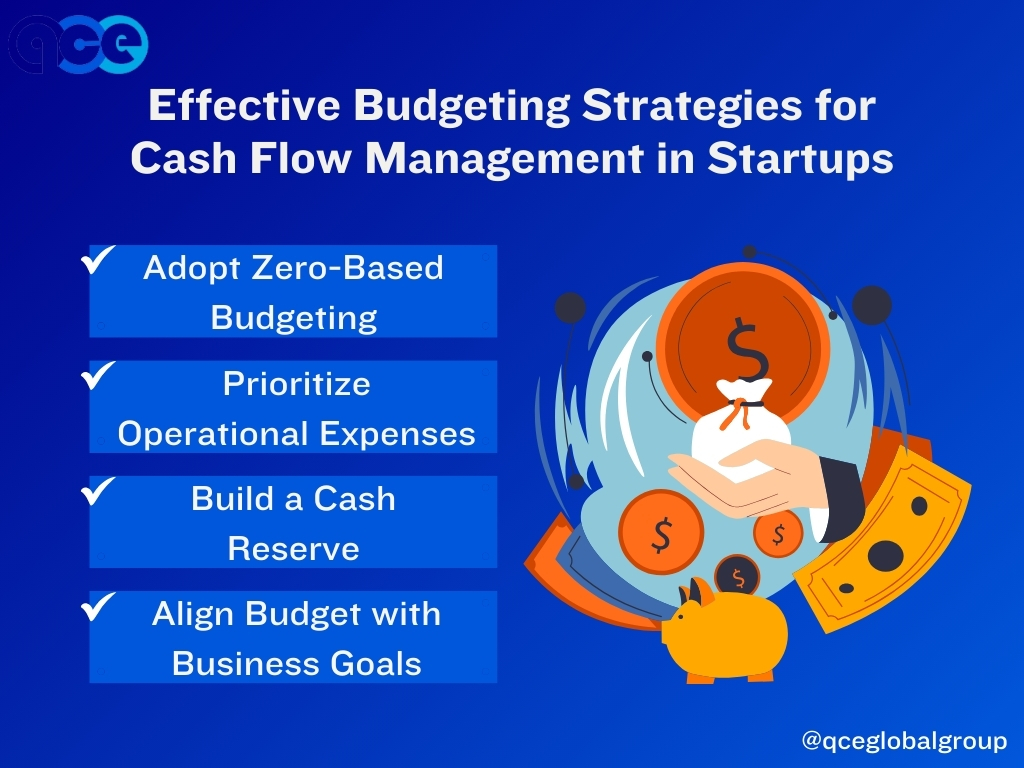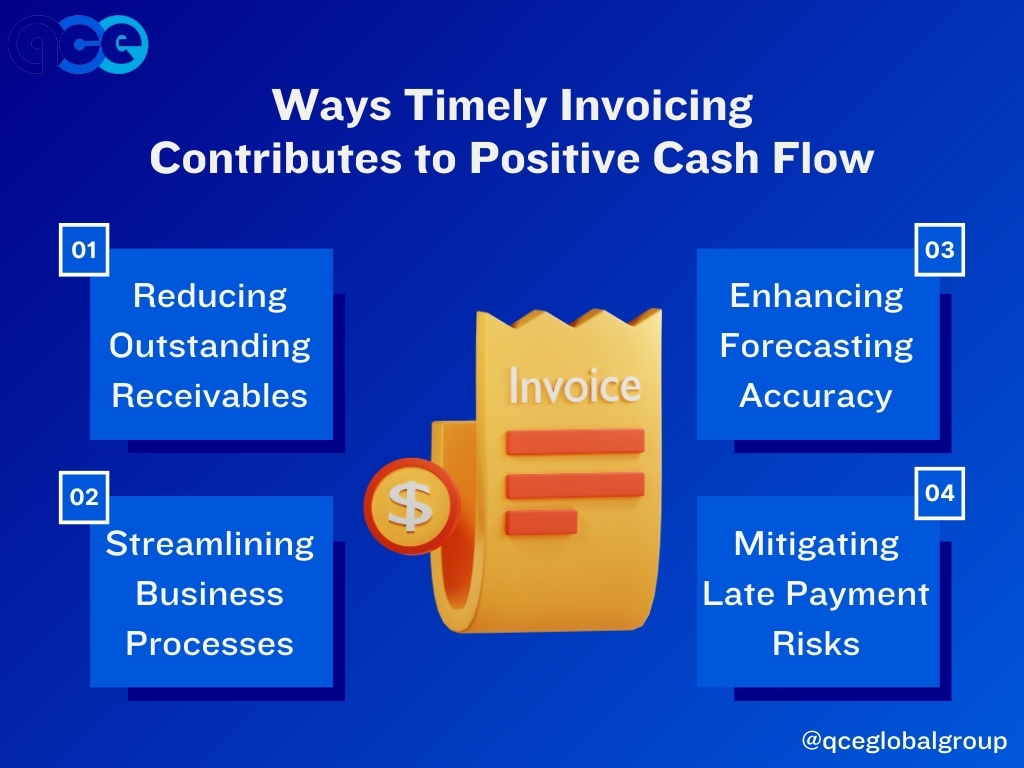Are you ready to safeguard your startup’s future by prioritizing healthy cash flow management?
Our expert team offers a comprehensive suite of services designed to optimize your financial operations, mitigate risks, and promote sustained growth.
Maintaining a healthy cash flow is crucial for the survival and growth of startups. Risks to cash flow can come from internal sources like poor inventory or debt management, or external factors like economic downturns. Building a safety net with business savings, implementing effective budgeting strategies, and regular financial forecasting can help manage cash flow. Timely invoicing, efficient inventory management, debt control, and use of technology can further streamline financial management and maintain positive cash flow. As Benjamin Franklin said, “By failing to prepare, you are preparing to fail,” hence it is vital to plan and prepare to ensure a robust financial future for your startup.
Table of Contents
- Understanding the Importance of Cash Flow in Startups
- Identifying Potential Risks to Your Startup’s Cash Flow
- Building a Financial Safety Net: The Role of Business Savings
- Implementing Effective Budgeting Strategies for Cash Flow Management
- The Significance of Regular Financial Forecasting in Maintaining Healthy Cash Flow
- How Timely Invoicing Contributes to Positive Cash Flow
- Managing Inventory Efficiently To Avoid Straining Your Startup’s Finances
- Why Debt Control is Crucial for Healthy Cash Flow in Startups
- Utilizing Technology for Streamlined Financial Management and Better Cash Flow
- Final Thoughts
Understanding the Importance of Cash Flow in Startups
In the world of startups, cash flow is king. It refers to the net amount of cash and its equivalents moving in and out of a business at any point in time. A positive cash flow indicates that a company’s liquid assets are increasing, enabling it to settle debts, reinvest in its business, return money to shareholders, pay expenses, and provide a buffer against future financial challenges. According to a study by U.S. Bank, 82% of business failures are due to poor cash management. Hence, understanding how money moves through your startup is essential for survival. Unlike profits, which only represent an economic gain and do not necessarily mean immediate liquidity, having positive cash flow ensures you have readily available funds necessary for daily operations.
Identifying Potential Risks to Your Startup’s Cash Flow

Risks can come from both internal and external sources. Internally, one could face issues such as overstocking or understocking inventory, leading to capital being held up or lost sales respectively. High overhead costs, late invoicing leading to delays in payment collection, or poor debt management can strain the company’s finances. Externally, these risks could present themselves as economic downturns impacting consumer purchasing power, market competition affecting pricing strategies, or unforeseen circumstances like natural disasters disrupting supply chains. Therefore, proactive risk identification is crucial for maintaining healthy cash flows.
- Market Research Failures: Inadequate understanding of the market can lead to overproduction, underproduction, or mispricing, which could significantly affect your cash flow.
- Lack of Financial Planning: Without proper budgeting and expense tracking, it’s easy to overspend, which can lead to cash flow problems.
- Overdependence on a Single Client: If a significant percentage of your revenue comes from one source, there’s a risk that losing that client could severely impact your cash flow.
- Inefficient Collections Process: If your business takes too long to collect payments or has a high default rate, it can create a cash flow bottleneck.
- High Employee Turnover: The costs of hiring and training new employees can drain cash resources, particularly for a startup.
- Regulatory Changes: Changes in regulations or laws can lead to unexpected expenses, affecting a startup’s cash flow.
- Poor Sales Forecasts: Overly optimistic sales forecasts can lead to overproduction or overstaffing, tying up cash unnecessarily.
- Rapid Expansion: While growth is generally good, expanding too quickly can strain your cash flow by requiring upfront costs before new revenue streams have time to develop.
- Currency Risks: If you’re doing business internationally, fluctuations in exchange rates can impact your cash flow.
- Unforeseen Circumstances: Events like lawsuits, natural disasters, or pandemics can have significant, unexpected impacts on your cash flow.
To mitigate these risks, startups should implement effective financial planning and control systems, diversify their client base, streamline their collections process, manage employee turnover, keep abreast of regulations, make conservative sales forecasts, and plan their expansion carefully. They should also consider insurance or contingency plans for unforeseen circumstances.
Building a Financial Safety Net: The Role of Business Savings
Business savings play an integral role in building your startup’s financial safety net. They act as buffers during lean periods when revenues dip below expenses, helping maintain smooth operations without resorting to costly borrowing or hasty asset liquidation. Having substantial savings also gives startups more control over their growth trajectory by allowing them room for strategic investments without relying on investors’ funding. According to J.P. Morgan Chase Institute, businesses with robust savings were 47% more likely to stay afloat after a year of operation.
- Building a Dedicated Savings Account: Startups should consider setting up a dedicated savings account for business operations. This account should be separate from the founder’s personal savings to ensure clear financial boundaries.
- Regular Savings Contributions: It’s crucial for startups to make regular contributions to their business savings, especially during profitable periods. This approach ensures that the business has a safety net during lean periods.
- Buffer for Unexpected Expenses: Having a substantial amount of business savings can serve as a buffer for unexpected expenses. This could range from equipment breakdowns to sudden changes in market trends that require quick adjustments.
- Long-Term Investment Opportunities: A strong savings account can open doors to long-term investment opportunities for the startup. It gives the business the freedom to explore new ventures without the pressure of immediate ROI.
- Enhancing Credit Profile: Consistent savings can help improve a startup’s credit profile. A healthy credit profile can be beneficial in securing future loans or attracting potential investors.
- Reducing Dependence on External Funding: With a robust savings account, startups can reduce their reliance on external funding. It allows them to grow at their own pace and make strategic decisions based on their financial capacities rather than investor expectations.
- Risk Mitigation: Business savings act as an insurance policy against the inherent risks of running a startup. It provides a cushion against potential financial setbacks, helping businesses stay afloat during challenging times.
- Improving Negotiating Power: Startups with substantial business savings can negotiate better terms with suppliers, landlords, and even investors. Their financial stability gives them a stronger bargaining position.
- Employee Benefits and Retention: Startups with a good financial cushion can invest in employee benefits, which can improve staff retention and productivity. They can also cover payroll during lean periods, avoiding layoffs and maintaining morale.
- R&D Investment: With a solid financial safety net, startups can allocate funds for research and development. This can lead to innovation, competitive advantage, and long-term growth.
- Focus on Core Business: With a secure financial safety net, startups can focus more on their core business operations and less on financial survival, leading to better products/services and customer satisfaction.
Implementing Effective Budgeting Strategies for Cash Flow Management

Budgeting is an essential tool for managing cash flow. It allows startups to plan their expenses, control costs, and ensure they have enough funds to cover operational needs. A well-crafted budget provides a roadmap for your financial journey by setting spending limits and identifying potential revenue sources. One effective strategy is the zero-based budget which necessitates every expense be justified in each new period. This approach fosters efficiency and cost-effectiveness, as it discourages unnecessary spending. Another technique is the rolling forecast method which involves updating the budget periodically based on recent financial data, thus ensuring your startup’s plans are always aligned with its current financial situation.
Here are the Top 10 Effective Budgeting Strategies for Cash Flow Management in Startups:
- Adopt Zero-Based Budgeting: This approach allows startups to justify each expense in each new period, ensuring that every dollar is allocated efficiently. It helps in cutting down unnecessary expenses and focuses on what’s vital for the business.
- Use the Rolling Forecast Method: This strategy involves updating the budget periodically based on the most recent financial data. This ensures that the startup’s plans align with its current financial situation, making it more adaptable to changes and unexpected situations.
- Prioritize Operational Expenses: Startups should prioritize necessary operational expenses like payroll, rent, utilities, and supplies in their budget. This ensures that the business can continue operating even during periods of low revenue.
- Build a Cash Reserve: Startups should include building a cash reserve in their budgeting strategy to cover unforeseen costs or financial downturns. This can act as a safety net, providing financial stability.
- Regular Financial Reviews: Regular reviews of financial performance against the budget can help startups identify any discrepancies and make necessary adjustments. This will help maintain financial health and ensure the business stays on track.
- Take Advantage of Technology: Using budgeting and cash management software can help automate the budgeting process, making it easier to track, analyze, and adjust the budget as needed. It can also provide valuable insights and financial forecasts.
- Involve the Entire Team: Getting input from all team members can lead to more accurate budgeting. Each department can provide insight into their specific needs and expenses, leading to more comprehensive and realistic budgeting.
- Focus on Revenue Generation: While cost control is important, focusing too much on expenses can limit growth. The budget should also include strategies for revenue generation such as marketing and sales initiatives.
- Flexible Budgeting: Startups should consider adopting a flexible budgeting approach, where budgets can be adjusted based on actual performance and changing market conditions. This can help businesses respond quickly to changes and take advantage of opportunities.
- Align Budget with Business Goals: The budget should align with the startup’s strategic goals. If the business plans to expand, for instance, the budget should reflect this by allocating funds to areas that will drive growth.
The Significance of Regular Financial Forecasting in Maintaining Healthy Cash Flow
Financial forecasting plays a pivotal role in maintaining healthy cash flow. It enables entrepreneurs to anticipate future revenues and expenses, thereby allowing them to make informed decisions regarding investments, growth strategies, or resource allocation. According to a survey by OnDeck Capital, 70% of small business owners who utilized financial forecasting reported higher profits than those who didn’t. Hence, forecasting not only helps prevent liquidity crises but also drives profitability.
- Risk Mitigation: Regular financial forecasting helps businesses identify potential risks and uncertainties in their cash flow, allowing them to take proactive measures to mitigate these risks and avoid cash flow problems.
- Improved Decision Making: By providing an accurate prediction of future revenues and expenses, financial forecasting supports informed decision-making, preventing costly mistakes and enabling more strategic investments.
- Budgeting and Planning: A regular financial forecasting allows businesses to plan and budget effectively. It provides the necessary insight to allocate resources efficiently, ensuring the business operates within its means and avoids unnecessary debt.
- Profit Optimization: Regular financial forecasting can help identify areas of inefficiency or waste, leading to improved operational effectiveness and ultimately, increased profits.
- Business Growth: By predicting future cash flow patterns, businesses can identify opportunities for growth and expansion, and plan their investments accordingly.
- Investor Relations: Regular financial forecasts can provide investors with a clear picture of a company’s financial health and growth potential, thereby fostering trust and attracting more investment.
- Competitive Advantage: Companies that forecast regularly can anticipate market trends and customer behavior, giving them a competitive edge.
- Crisis Management: In case of an unexpected financial crisis, a regular financial forecast can help a company quickly adjust its strategies and minimize the impact on its cash flow.
- Performance Evaluation: Regular financial forecasting helps businesses measure their performance against their financial goals and make necessary adjustments.
- Sustainability: Regular financial forecasting ensures that a business operates sustainably, preventing over-expansion or reckless spending that could lead to cash flow problems in the future.
How Timely Invoicing Contributes to Positive Cash Flow

Timely invoicing contributes significantly towards maintaining positive cash flow as it ensures businesses get paid faster, reducing the gap between expenditure on goods/services rendered and payment received, thus reducing chances of running into liquidity issues. Efficient invoice management includes sending invoices promptly after delivering products/services, clearly stating payment terms, following up on unpaid invoices, offering various payment options etc., all aimed at accelerating payments from customers thereby improving cash flows.
Here are the 10 Ways Timely Invoicing Contributes to Positive Cash Flow:
- Reducing Outstanding Receivables: Timely invoicing helps reduce the number of days sales outstanding (DSO), which directly contributes to positive cash flow. The sooner a business sends an invoice to the customer, the sooner it gets paid, thus minimizing the risk of late or non-payment.
- Streamlining Business Processes: Efficient and timely invoicing helps streamline business operations. It reduces administrative burden, frees up resources, and allows the business to focus on core operations, thereby enhancing productivity and profitability.
- Improving Customer Relations: Sending invoices promptly after the completion of a job is a professional practice that can strengthen customer relations. It ensures transparency, builds trust, and can encourage customers to make prompt payments.
- Enhancing Forecasting Accuracy: Timely invoicing enables businesses to have a more accurate projection of their cash flow, helping them make informed financial decisions, plan for future investments, and manage potential financial risks.
- Encouraging Early Payments: Businesses can incentivize customers to pay their invoices early by offering discounts or other benefits. This not only improves the cash flow but also strengthens the customer-business relationship.
- Providing Clear Payment Terms: Well-defined payment terms and conditions ensure that the customer knows when the payment is due, reducing the likelihood of delays or disputes.
- Using Digital Tools: Implementing digital invoicing solutions can automate the invoicing process, making it faster and more efficient. It allows businesses to track invoices in real-time, send reminders for unpaid invoices, and accept multiple forms of payment, thus speeding up the payment process.
- Mitigating Late Payment Risks: By sending out invoices promptly and following up regularly, businesses can mitigate the risk of late payments and maintain a steady flow of income.
- Facilitating Financial Management: Reliable cash flow resulting from timely invoicing helps businesses manage their finances more effectively, ensuring they can cover operational costs, invest in growth, and avoid potential financial pitfalls.
- Building a Healthy Business Reputation: Timely invoicing reflects positively on a business’s professionalism and reliability, thereby attracting more customers and promoting business growth.
Managing Inventory Efficiently To Avoid Straining Your Startup’s Finances
Inventory management can greatly affect your startup’s finances. Poor management can lead to overstocking, tying up valuable capital, or understocking, leading to lost sales opportunities, both hurting your cash flow. Efficient inventory management ensures you have just enough stock to meet demand without tying up excessive capital. Techniques like Just-in-Time (JIT) inventory system, where goods are ordered only as required in the production process, can help minimize storage costs and free up cash for other operational needs, thus contributing towards a healthier cash flow.
Here are the Top 10 Techniques for Efficient Inventory Management in Startups:
- Implementing a Real-Time Inventory Tracking System: This system will provide real-time data about the stock levels, helping in making informed decisions about when to purchase more stock and in what quantity.
- Using Automated Reordering Software: This software will automatically place orders for new stock when the inventory levels fall below a certain threshold. This will prevent understocking and overstocking scenarios.
- Implementing a Centralized Inventory Management System: This will allow you to manage all your inventory from one place, reducing the chances of errors and improving efficiency.
- Using Cloud-Based Inventory Management Software: This will not only save on storage costs but also allow for easy access to inventory data from anywhere, anytime.
- Implementing FIFO (First In, First Out) Approach: This will ensure that the oldest stock is sold first, reducing the chances of stock expiring or becoming obsolete.
- Conducting Regular Inventory Audits: This will help identify any discrepancies in the inventory data and rectify them on time.
- Implementing ABC Analysis: This technique categorizes inventory into three categories based on their importance, helping in better inventory control.
- Using Vendor-Managed Inventory (VMI): In this arrangement, the vendor takes responsibility for managing the inventory, reducing the burden on the startup.
- Implementing a Demand Forecasting System: This system will predict future sales, helping in better inventory planning.
- Training Staff on Efficient Inventory Management: This will ensure that all staff members are aware of the importance of inventory management and how to manage it efficiently. They can then make informed decisions about stock handling.
Why Debt Control is Crucial for Healthy Cash Flow in Startups

Startups often need to borrow money to fund their operations, but excessive debt can lead to financial stress which could affect your startup’s ability to operate normally. High interest payments can drain your resources leading to negative cash flows which could eventually cause bankruptcy. Debt control strategies such as consolidating loans, negotiating better loan terms, or paying off high-interest debts first can help manage debt levels effectively, ensuring that they do not strain your startup’s finances thereby maintaining healthy cash flows.
Here are the 10 Effective Debt Control Strategies for Maintaining Healthy Cash Flow in Startups:
- Implementing a Debt Management Plan: A debt management plan can help startups manage their financial obligations. This involves understanding the debt structure, interest rates, and repayment schedules and making a plan to handle these.
- Debt Consolidation: Startups can consider consolidating their debts into a single loan with a lower interest rate. This could make repayment more manageable and reduce financial stress.
- Prioritizing High-Interest Debts: Startups need to prioritize repaying high-interest debts first to reduce the total amount of interest paid over time.
- Negotiating Better Loan Terms: Startups can negotiate for better loan terms, such as lower interest rates or extended repayment periods. This can help to alleviate immediate financial pressure and improve cash flow.
- Equity Financing: Startups could consider equity financing as an alternative to debt. This involves selling a stake in the company to raise funds, which can help to reduce reliance on debt.
- Regular Financial Audits: Conducting regular financial audits can help startups identify potential issues and take corrective actions before they become serious problems.
- Cash Flow Forecasting: Regular cash flow forecasting can help startups anticipate future financial needs and plan accordingly. This can help to avoid excessive borrowing and maintain healthy cash flow.
- Adopting Lean Startup Principles: By keeping costs low and only spending on necessary operations, startups can reduce their need for debt financing.
- Building an Emergency Fund: Having an emergency fund can provide a financial cushion for unexpected expenses, reducing the need for additional debt.
- Financial Literacy Training: Providing financial literacy training for key members of the startup team can help them understand the importance of debt control and strategies for managing it effectively. This can lead to more informed decision-making about borrowing and debt repayment.
Utilizing Technology for Streamlined Financial Management and Better Cash Flow
Technology has revolutionized financial management by providing solutions that automate processes such as invoicing, expense tracking, or budgeting, thereby saving time and reducing errors. Tools like QuickBooks or Xero provide real-time insights into your financials, helping monitor and manage cash flows efficiently. Moreover, cloud-based accounting solutions provide flexibility of access from anywhere at any time, enabling startups to stay on top of their finances always thus contributing towards keeping the cash flow positive.
- Integration with Online Banking: Financial management software can be integrated with online banking systems, allowing businesses to view and manage all of their financial transactions in one place. This not only saves time but also provides a more accurate picture of cash flows.
- Artificial Intelligence: With advancements in AI, financial management tools can predict future cash flows based on historical data. This can help businesses plan better and make more informed decisions.
- Mobile Apps: With the rise of mobile technology, financial management apps have gained popularity. These apps provide quick access to finance data and help in managing cash flows on the go.
- Automation of Invoice Processing: Technologies like OCR (Optical Character Recognition) can be used to automate invoice processing, reducing manual labor and errors, and improving cash flow management.
- Real-Time Reporting: Technologies like Big Data and Analytics can provide real-time reports on cash flows, making it easier for businesses to monitor and manage their finances.
- Blockchain Technology: Blockchain can revolutionize financial management by providing a secure and transparent platform for transactions. This can help in reducing fraud and improving cash flow management.
- Integration with Payment Gateways: Financial management tools can be integrated with various payment gateways, making it easier for businesses to receive payments and manage their cash flows.
- Cloud-Based Payroll Management: Cloud-based payroll systems can help in streamlining payroll processes and improving cash flow management by ensuring timely and accurate payments.
- Digital Wallets: Digital wallets can improve cash flow management by making transactions quicker and easier. They also provide a secure platform for transactions, reducing the risk of fraud.
- Use of APIs for Customization: APIs (Application Programming Interfaces) can be used to customize financial management tools as per the specific needs of a business. This can help in improving the efficiency and effectiveness of cash flow management.
Final Thoughts
Maintaining healthy cash flows requires careful planning, efficient management of receivables, payables, inventory, debt, along with proactive risk identification and mitigation strategies. Utilizing technology can assist greatly in this endeavor by automating various processes, thus ensuring accuracy and saving valuable time. While challenges are inevitable on the entrepreneurial journey, being financially prepared helps navigate these challenges smoothly, ensuring sustained growth and success of your startup. As Benjamin Franklin famously said, “By failing to prepare, you are preparing to fail,” therefore, taking preventive measures today will secure a robust financial future for your startup tomorrow.

From budgeting strategies to debt control, from efficient inventory management to seamless financial forecasting, we’re your one-stop solution. Harness the power of technology and our expertise to keep your startup’s cash flow healthy.
Contact us now to learn more! Secure your startup’s financial health today for a prosperous tomorrow.



